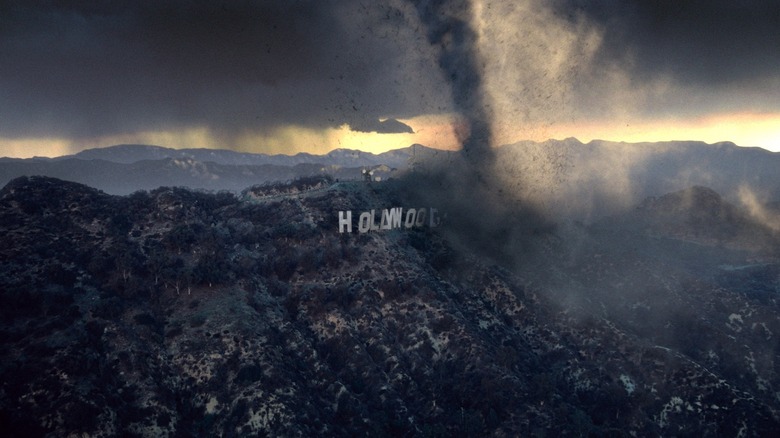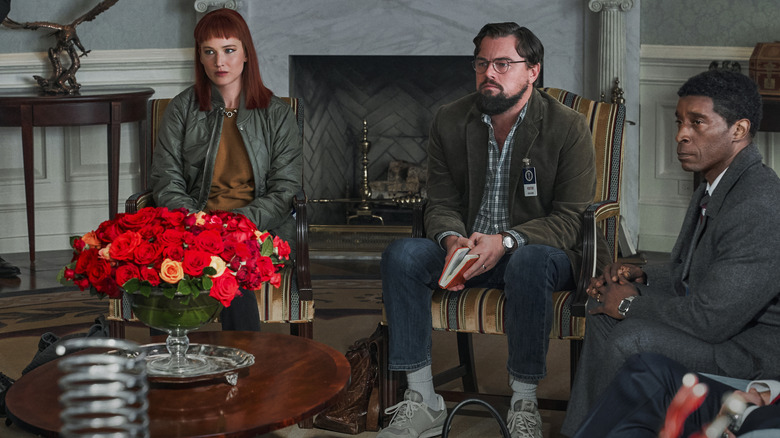Moonfall Director Roland Emmerich Didn't Think Don't Look Up Was Disaster-Y Enough
It's always great when directors expand their boundaries and evolve over time, tackling projects that they might never have even considered even just a few years ago. Director Adam McKay gradually progressed from Will Ferrell studio comedies to increasingly social-conscious dramas with an eye on awards attention, such as "The Big Short" or "Vice" or, most recently, the divisive Netflix film "Don't Look Up." And then there are directors like Roland Emmerich, who know their lane and largely stay in it. With the odd exception here and there, Emmerich has been directing almost nothing but disaster flicks for the past few decades, which will culminate with his biggest and most absurd one yet — "Moonfall," aka the one where the moon is out of orbit.
Perhaps no filmmaker alive fashions themselves as more of an expert on the end of the world than the "Independence Day," "Godzilla," "The Day After Tomorrow," and "2012" director himself. In that light, we probably should've expected him to weigh in on "Don't Look Up" sooner or later, which concerns the impending arrival of a deadly, planet-killing comet headed straight for Earth. Though far from your typical big-budget disaster movie, "Don't Look Up" trades in bombast and spectacle for similar depictions of humanity grappling with the end of life as they know it. All that said, however, it doesn't seem like we should count Emmerich as one of the admirers of McKay's latest.
You're not going to believe this, but Roland Emmerich is of the opinion that "Don't Look Up" didn't go nearly far enough in its world-ending stakes. Who'd have thought! Check out his full comments below.
Roland Emmerich Makes Some Points
Think back to "The Day After Tomorrow," the Roland Emmerich climate change movie that never bothered to come up with some elaborate analogy or metaphor in order to hide what it's really about. No, "The Day After Tomorrow" takes a baby-faced Jake Gyllenhaal and Emmy Rossum and throws them headlong into the most nightmarish environmental catastrophe to ever grace the silver screen. Regardless of the final product, there's a purity of ambition in such a straightforward approach that one just simply has to respect.
Then we have "Don't Look Up," which attempts to make a statement on humanity's (but mostly America's) overall inaction in the face of disaster while doubling as commentary on the Donald Trump era of politics, all through the use of the (very real) threat of an incoming comet ... and it's easy to see why many viewers thought the movie was a bit of a mess.
Enter Emmerich, who talked with The Hollywood Reporter ahead of the release of "Moonfall." Naturally, the filmmaker was asked about comparing his earlier climate change film to McKay's take on similar themes. His response is, well, as Emmerich as it gets. The director said:
"'The Day After Tomorrow' was ahead of its time, and I'm a little bit worried that 'Don't Look Up' will not do anything. You have to really, really frighten people. And at the end [of 'Don't Look Up'] it's like ... they all sit there and eat and that's it. And then, a very comedic scene with Meryl Streep. I didn't care too much about it, with all the big actors and everything. Nah."
It's the final, dismissive "Nah" at the end that really makes it for me, in all honesty. I'm in the weird position of agreeing with Emmerich's overall point that "Don't Look Up" will ultimately fail to change any minds whatsoever, but only because of its condescending attitude and sneering contempt for those viewers its supposedly meant for. I actually thought the final dinner scene was one of the best, most quietly dignified moments in the entire movie ... until, like Emmerich notes, the movie turns right back into farcical territory at the very end.
Let this be a lesson to all prospective filmmakers. When making a disaster movie, simply think to yourself: "What Would Roland Emmerich Do?"
"Don't Look Up" is currently streaming on Netflix, and "Moonfall" comes to theaters on February 4, 2022.

